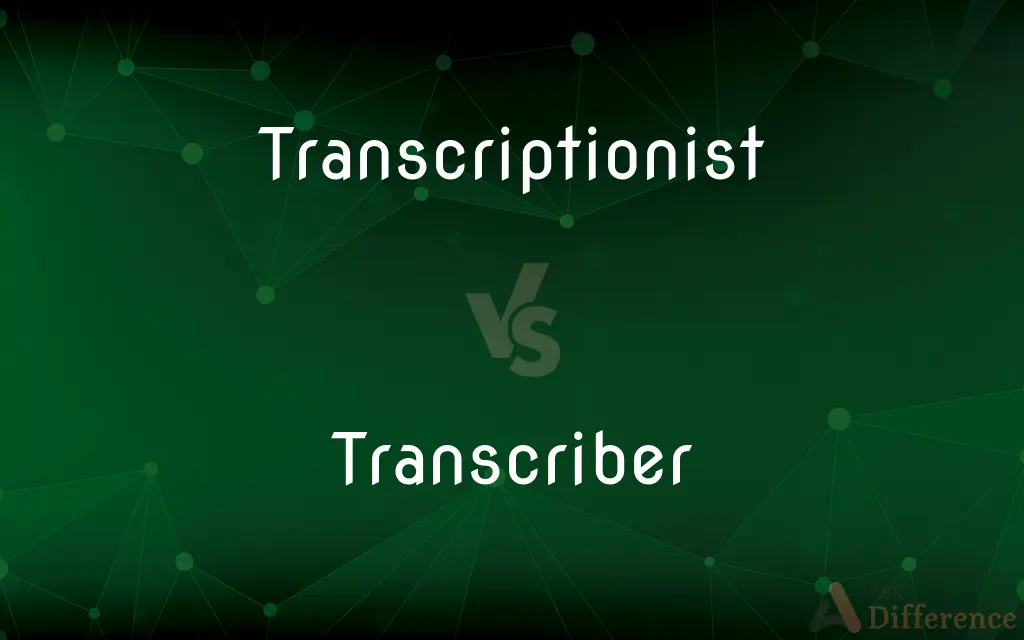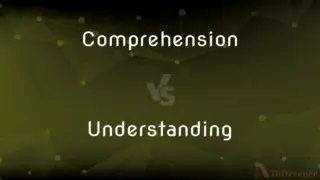Transcriptionist vs. Transcriber — What's the Difference?
By Tayyaba Rehman & Fiza Rafique — Updated on March 14, 2024
A transcriptionist interprets and documents audio recordings, focusing on context and accuracy, while a transcriber directly converts speech to text, often verbatim.

Difference Between Transcriptionist and Transcriber
Table of Contents
ADVERTISEMENT
Key Differences
Transcriptionists are skilled professionals who convert audio recordings into written documents, paying close attention to the context and nuances of the speech to ensure accuracy and readability. They often work in specialized fields like medical or legal, where understanding specific terminology is crucial. On the other hand, transcribers focus on converting speech into written form, usually doing so verbatim. This role doesn't always require the same level of specialized knowledge as a transcriptionist's job might.
While transcriptionists may need to interpret or paraphrase parts of a recording to maintain the clarity and flow of written text, transcribers typically aim for a word-for-word transcription. This difference highlights the transcriptionist's role in ensuring the final document is not only accurate but also coherent and easily readable, whereas transcribers prioritize exact replication of spoken words.
Transcriptionists often work with complex materials that require a deep understanding of the subject matter to accurately convert speech into text. They must be adept at recognizing industry-specific jargon and understanding various accents and speech nuances. Transcribers, however, may not need to possess such specialized knowledge, as their primary goal is to capture the spoken word as accurately as possible, regardless of the content's complexity.
The tools and software used by transcriptionists and transcribers can also differ, with transcriptionists sometimes requiring more advanced software that includes features for managing specialized terminology or deciphering difficult audio, reflecting their need to produce more polished and nuanced documents. Conversely, transcribers might use more straightforward transcription tools that focus on speed and accuracy of text reproduction without the need for advanced editing or content interpretation capabilities.
In terms of career paths, transcriptionists might find more opportunities in specific industries that require detailed knowledge and experience, such as legal, medical, or technical fields. This specialization can lead to higher earning potential and the possibility of certification in their field of expertise. Transcribers, while also valuable, may work in a broader range of industries and might not require as much specialized training, often making their role more flexible but potentially less specialized.
ADVERTISEMENT
Comparison Chart
Definition
Converts audio into text with a focus on context and accuracy.
Converts speech to text, often verbatim.
Specialization
May require knowledge of specific fields (e.g., medical, legal).
Less likely to require specialized knowledge.
Accuracy
Focuses on clarity, readability, and context.
Prioritizes exact replication of speech.
Tools
Uses advanced software for editing and terminology management.
Utilizes straightforward transcription tools for speed.
Career Path
Opportunities in specialized fields; potential for higher earnings.
Broader range of industries; flexible role with diverse options.
Compare with Definitions
Transcriptionist
Requires knowledge of specific terminology.
Legal transcriptionists must understand legal jargon to accurately document court proceedings.
Transcriber
Offers flexibility in work across different fields.
Freelance transcribers often choose projects from diverse topics, from documentaries to business meetings.
Transcriptionist
Focuses on context and clarity.
The transcriptionist edited the transcript for readability, ensuring technical terms were accurately captured.
Transcriber
Focuses on accuracy of speech reproduction.
To ensure accuracy, the transcriber listened to the audio multiple times.
Transcriptionist
Professional who interprets and converts audio to text.
A medical transcriptionist transcribes doctors' voice notes into patient records.
Transcriber
Converts spoken words into written form verbatim.
The transcriber provided a word-for-word transcript of the recorded interview.
Transcriptionist
May paraphrase for coherence.
To maintain the document's flow, the transcriptionist paraphrased repetitive speech.
Transcriber
May not require specialized knowledge.
General transcribers work across various industries, transcribing anything from lectures to podcasts.
Transcriptionist
Works in specialized fields.
A transcriptionist specializing in scientific research transcribed interviews with biologists.
Transcriber
Utilizes transcription software for efficiency.
The transcriber used software with a foot pedal to pause and play audio easily.
Transcriptionist
The act or process of transcribing.
Transcriber
Transcriber is an open-source software tool for the transcription and annotation of speech signals for linguistic research. It supports multiple hierarchical layers of segmentation, named entity annotation, speaker lists, topic lists, and overlapping speakers.
Transcriptionist
(Music) An adaptation of a composition.
Transcriber
To make a full written or typewritten copy of (dictated material, for example).
Transcriptionist
A recorded radio or television program.
Transcriber
(Computers) To transfer (information) from one recording and storing system to another.
Transcriptionist
(Linguistics) A representation of speech sounds in phonetic symbols.
Transcriber
To adapt or arrange (a composition) for a voice or instrument other than the original.
Transcriptionist
(Genetics) The synthesis of messenger RNA from a DNA template through the formation of base pairs, resulting in a transfer of genetic information that codes for amino acid sequences composing proteins.
Transcriber
To translate (a composition) from one notational system to another.
Transcriptionist
A person who transcribes.
Transcriber
To reduce (live or recorded music) to notation.
Transcriptionist
A writer of transcripts.
Transcriber
To record, usually on tape, for broadcast at a later date.
Transcriber
(Linguistics) To represent (speech sounds) by phonetic symbols.
Transcriber
To translate or transliterate.
Transcriber
(Biology) To cause (DNA) to undergo transcription.
Transcriber
A person who transcribes; a transcriptionist.
Transcriber
(computing) A device or program that transcribes data.
Transcriber
One who transcribes, or writes from a copy; a copier; a copyist.
Transcriber
A person who translates written messages from one language to another
Transcriber
Someone who rewrites in a different script
Transcriber
Someone who represents the sounds of speech in phonetic notation
Transcriber
Someone who makes a written version of spoken material
Transcriber
A musician who adapts a composition for particular voices or instruments or for another style of performance
Common Curiosities
What is a transcriptionist?
A transcriptionist is a professional who converts audio recordings into written text, focusing on accuracy, context, and the clarity of the document.
Do transcriptionists need specialized knowledge?
Yes, transcriptionists often work in fields that require specialized knowledge, such as medical or legal, to accurately interpret and document specific terminology.
Can transcribers work in any industry?
Transcribers can work across a broad range of industries, as their main task is to accurately convert spoken words into text, without the need for specialized knowledge.
What is the main difference between a transcriptionist and a transcriber?
The main difference lies in the focus: transcriptionists emphasize context, clarity, and accuracy, often in specialized fields, while transcribers prioritize exact replication of speech.
Can a transcriptionist work as a transcriber?
Yes, a transcriptionist can work as a transcriber, especially in settings that don't require specialized knowledge, though their skills may exceed the requirements of typical transcribing tasks.
What does a transcriber do?
A transcriber converts speech into written text, typically doing so verbatim, without necessarily interpreting or editing the content for clarity.
What tools do transcriptionists use?
Transcriptionists use advanced transcription software that may include features for managing specialized terminology or editing complex audio files.
How do transcribers ensure accuracy?
Transcribers may listen to audio multiple times and use transcription tools that help them pause, rewind, and play audio easily for accurate text reproduction.
Do transcriptionists paraphrase the audio they transcribe?
Yes, transcriptionists may paraphrase parts of audio to ensure the final text is coherent and understandable, particularly in complex or specialized content.
Are transcribers required to understand specialized jargon?
Not necessarily, as transcribers focus on verbatim transcription, which doesn't require interpreting or contextualizing the speech based on specialized knowledge.
Is being a transcriber easier than being a transcriptionist?
The difficulty depends on the context: transcribing can be straightforward but requires meticulous attention to detail, while transcription requires additional interpretation skills.
What is the career outlook for transcriptionists and transcribers?
The demand varies by industry, with specialized transcriptionists often finding more opportunities and potentially higher earnings compared to general transcribers.
Can transcription software replace transcriptionists and transcribers?
While software can assist with transcription, it often cannot fully replace human professionals due to the need for accuracy, context understanding, and nuanced interpretation.
How do transcriptionists and transcribers improve their skills?
They can improve their skills through practice, continued education, and by staying updated on industry-specific terminology and transcription technologies.
What industries commonly employ transcriptionists?
Industries like healthcare, law, and scientific research commonly employ transcriptionists for their ability to accurately document specialized content.
Share Your Discovery

Previous Comparison
Comprehension vs. Understanding
Next Comparison
Cush vs. KushAuthor Spotlight
Written by
Tayyaba RehmanTayyaba Rehman is a distinguished writer, currently serving as a primary contributor to askdifference.com. As a researcher in semantics and etymology, Tayyaba's passion for the complexity of languages and their distinctions has found a perfect home on the platform. Tayyaba delves into the intricacies of language, distinguishing between commonly confused words and phrases, thereby providing clarity for readers worldwide.
Co-written by
Fiza RafiqueFiza Rafique is a skilled content writer at AskDifference.com, where she meticulously refines and enhances written pieces. Drawing from her vast editorial expertise, Fiza ensures clarity, accuracy, and precision in every article. Passionate about language, she continually seeks to elevate the quality of content for readers worldwide.
















































